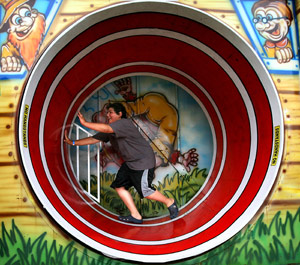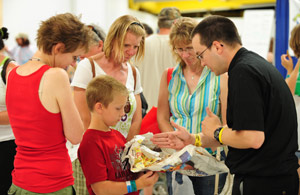Being your children’s role model is one of the best ways to help your children grow up Catholic, according to author and longtime pastoral minister, Leisa Anslinger.
 Alexander Maldonado takes a spin in a carnival fun house at the St. Frances of Rome Summerfest in Cicero, Ill., July 24, 2011 in this file photo In her Oct. 10 presentation at St. Alphonsus Parish, Greendale, speaker and author Leisa Anslinger, suggested that parents seek out social events such as parish festivals in their faith communities as one way to help children become connected to their Catholic faith. (CNS photo by Karen Callaway, Catholic New World)Anslinger, director of Growing Up Catholic, author of a regular column in Ministry and Liturgy Magazine, and co-author of “Forming Generous Hearts: Stewardship Planning for Lifelong Faith Formation,” visited the Milwaukee Archdiocese in early October to give several presentations.
Alexander Maldonado takes a spin in a carnival fun house at the St. Frances of Rome Summerfest in Cicero, Ill., July 24, 2011 in this file photo In her Oct. 10 presentation at St. Alphonsus Parish, Greendale, speaker and author Leisa Anslinger, suggested that parents seek out social events such as parish festivals in their faith communities as one way to help children become connected to their Catholic faith. (CNS photo by Karen Callaway, Catholic New World)Anslinger, director of Growing Up Catholic, author of a regular column in Ministry and Liturgy Magazine, and co-author of “Forming Generous Hearts: Stewardship Planning for Lifelong Faith Formation,” visited the Milwaukee Archdiocese in early October to give several presentations.
About 30 people attended the first presentation at St. Alphonsus Parish, Greendale, on Monday, Oct. 10.
Using a series of questions for the audience to discuss in small groups, Anslinger initiated the faith conversation . Thirty years ago, when today’s parents of school-age children were growing up, people were very private about their faith, their family, their struggles and triumphs, she said. Today, people are more open about their lives, yet they often continue to keep their faith private. Anslinger encouraged her audience to take pride in their faith, embrace it, take a leadership role in it and pass it on to their children.
The first question she posed to her audience was, “What are your hopes and dreams for your children, your family?”
The audience’s responses included such things as instilling good values and morals and providing support to our children so they can grow up to be strong, healthy adults.
How do we accomplish these goals, asked Anslinger.
“What is it that helps some young people to develop a lively faith in God that lasts and grows?” she asked, adding “How hard is it to put God first and how hard is it to make Sunday Mass a priority?”
Anslinger cited evidence that showed that people who regularly participate in church services:
- Live longer (on average 7.6 years).
- Experience less depression, drug use and abuse and suicide.
- Experience a greater sense of well-being, hope and optimism, purpose, meaning and self-esteem.
- Have a greater sense of satisfaction.
There are benefits to belonging to a community of parish life, she said, noting that those who are active in their parish are dramatically more likely to be satisfied with the circumstances of their lives. In other words, they are happier, she said. The stronger a connection that people have to their parish life, the more they serve, suggested Anslinger.
Anslinger asked, “What happens in your home that is an extension of what happens at Mass?”
One mother in the audience said that in her parish, families help other families with simple things like carpooling as well as more important things like making meals when a parent is ill. Another mom said that her husband often works second shift, but her family makes it a priority to have at least one meal together every day. They pray at meals and if there is a visitor to their home, they always add an extra prayer, she said. Helping neighbors with snow blowing and welcoming new neighbors were other examples.
 Deacon William VanDynhoven blesses a crucifix held by Andrew Douglas, 8, of Princeton, in the Madison Diocese, July 8, 2011 at Lifest, a Christian music festival in Oshkosh. Speaker and author Leisa Anslinger suggests that parents seek out social events in their faith communities to help children stay connected to their Catholic faith. (CNS photo by Sam Lucero, The Compass) One woman said that she tells her children and family members that she is praying for them and she says they are so grateful for her prayers. Sometimes, she said, the family members thank her for the good things that happen in their lives because they know her prayers were heard.
Deacon William VanDynhoven blesses a crucifix held by Andrew Douglas, 8, of Princeton, in the Madison Diocese, July 8, 2011 at Lifest, a Christian music festival in Oshkosh. Speaker and author Leisa Anslinger suggests that parents seek out social events in their faith communities to help children stay connected to their Catholic faith. (CNS photo by Sam Lucero, The Compass) One woman said that she tells her children and family members that she is praying for them and she says they are so grateful for her prayers. Sometimes, she said, the family members thank her for the good things that happen in their lives because they know her prayers were heard.
Jenny Weinsensel of St. Rita Parish, Racine, described one of her family’s traditions.
“At the end of the day, we talk about what our closest moment to God was during the day,” she said, explaining she learned this technique through the Cursillo Movement, which offers three-day Catholic retreats and fosters a greater sense of faith.
Anslinger added that this was also an attribute of Ignatian theology, in which one reflects at the end of every day on one’s successes and failures of that day. She offered other examples of how to take one’s faith from the church pew into the home, such as giving children a rosary or by having faith-related discussions about what the kids watch on television and see on the Internet.
Anslinger then turned the discussion toward teenagers. She said parents don’t have to talk about their faith all the time; they need to live it. Teenagers absorb the example shown by their parents, “If my parents live it, so will I.” How can parents live out their faith?
Pray together!
The most important time for prayer together is at Sunday Mass, every Sunday, according to Anslinger. In addition to Sunday Mass, she suggested participating in seasonal prayers such as creating and lighting an Advent wreath, lighting an Easter candle and praying the rosary during the months of the Blessed Mother, May and October.
Pray at home, she said, and let children know the importance of prayer in one’s life. Join a Bible study, get a copy of the “Catechism of the Catholic Church,” or, if the catechism seems too burdensome,then get a copy of “The Growing Faith Project,” a series of 48 smaller, eight-page books that are a more reflective form of the catechism.
Play together!
She encouraged her audience to seek social events in their parish communities.
“Go to your parish social events: school auction, fish fry or summer parish festival,” she said, adding, there are so many social outlets in your parish and neighboring parishes. And while you are headed to the event, reach out to others and draw them in, bring them along, she suggested.
Whether praying together or playing together, parents let their children know they are active participants in the ongoing faith journey, said Anslinger.
Near the end of her presentation, she asked: “Who has had the most positive influence on your life?” This person, she noted, usually: builds trust, offers compassion, provides stability, brings trust.
Most often this person is a parent or grandparent.
She also asked her audience to consider:
- Who helped you develop faith in Christ?
- Who encourages you now to live as a faith-filled Christian?
- What about that person is most compelling or inspiring?
Laurie Staniszewski, of St. Alphonsus Parish, Greendale, said that person was her mother. At her mother’s funeral, her brother eulogized, “The greatest gift to our mother would have been to see her children being kind to others.”
Staniszewski added that her mother, “would never say anything mean about anyone. She was patient, giving, instilled a love of family and led by example.”
Some people said that a favorite priest or a parish member helped them to develop their faith. Anslinger called on audience members to think of the person who has been his or her inspiration for faith and demonstrate to their children how to live their faith-filled life.
She concluded that one must be the children’s role model for being a faithful Catholic.
Live it. Authentically foster and be open to a relationship with Christ, said Anslinger.
Be involved. Get connected in some really deep way with your faith and people who share it.
Pray. Allow God to be the guiding force in your life.
Share. Think of the people who have shared their faith with you.
